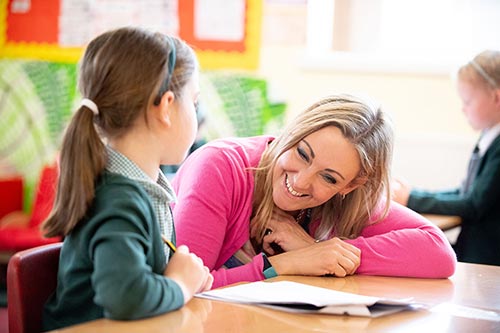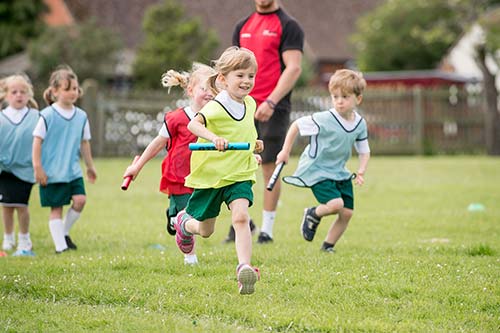Early Years Foundation Stage
Our children leave Snitterfield curious, inspired with a sense of their own self-worth while contributing positively to society.
Intent
At Snitterfield Primary School we want children to be happy, confident, well rounded individuals with a love of learning. We believe in providing children with a nurturing and stimulating environment that builds on each individual’s needs and interests, supporting them to thrive and fulfil their own unique potential.
Practitioners build warm and positive relationships which encourage children to become confident, independent, resilient learners. We value all communities and cultures in our setting and promote tolerance and respect for all. This along with consistent routines and strong relationships with parents is key. We support children to develop high expectations of themselves which we believe in turn will lead to high aspirations. We are committed to providing the best possible start to their school life, teaching them skills and giving them experiences which will ensure their well-being now and success in the future.
Implementation
Children in the early years at Snitterfield Primary School achieve this through an inspiring, challenging curriculum which provides memorable learning experiences that excite, engage and promote curiosity and develop a lifelong love of learning.
Children should have the opportunity to learn through play. We believe learning should be fun, engaging and suitably challenging. We value the importance of our outdoor environment and believe that it offers children the opportunity to develop their thinking and collaborative skills. Our curriculum is designed to recognise children’s prior learning both from previous settings and their experiences at home. This provides the best possible start ensuring each individual makes swift progress from their various starting points.
Children learn through a balance of child-initiated and adult-directed activities and challenges. The week is carefully structured so that children have rigorous directed teaching in English, Mathematics and Phonics every day. We also ensure regular sessions to focus on the prime areas of the curriculum and themed sessions to focus UtW and EAD. These sessions are followed by group work where children work with a member of staff to develop their skills. This focused group time enables the teacher to systematically check for understanding, identify and respond to misconceptions quickly and provide real-time verbal feedback which results in a strong impact on the acquisition of new learning. The structure of the day changes throughout the year to take into consideration the changing needs of the children.
We follow a seasonal and thematic approach which is enriched with classroom enhancements, visitors and trips as appropriate and promote a language rich environment through the use of songs, rhymes, and stories. Staff support children to gather words at pace in order to become effective communicators. Our themes are supported by quality key texts which are chosen carefully to encourage children’s speech, language and communication development. All planning however is flexible and responsive to children’s needs so can be changed and adapted according to a cohorts interests. Children are provided with a wide range of opportunities to engage in ‘exploration’ throughout a variety of experiences, which are planned to engage and challenge them in enhanced and continuous provision. The curriculum is planned for the inside and outside classrooms and is planned in a cross-curricular way to enable all aspects of the children’s development including UtW and EAD as well as to promote sustained thinking and active learning.
We consider the physical development of our children to be of utmost importance. Children have opportunities develop both their gross and fine motor skills in order that they become competent movers understanding the capability of their bodies. They can then explore their environment and make appropriate decisions that enable them to develop their confidence and creativity in a wide range of physical situations and become lifelong movers. We ensure children have opportunities to develop these skills through specific lessons and a wide range of opportunities in provision. Using a series of programmes which progress and adjust according to the children’s needs we further develop and refine our children’s fine motor skills in order that they develop the skills to become competent writers.
Literacy
Phonics Reading & Writing
Reading is at the heart of our curriculum.
Children follow a highly engaging synthetic systematic phonics programme called ‘Monster Phonics’ to support them in meeting good outcomes for reading.
Children also enjoy reading a variety of books inside and outside of school through quality guided reading sessions and independent reading with adults. Children are sent home with a fully decodable phonics reading book that is tailored and suited to their individual phonics level. A rigorous and sequential approach to the reading curriculum such as Monster Phonics develops pupils’ fluency, confidence and enjoyment in reading. At all stages throughout the delivery of the programme, children’s reading attainment is assessed and gaps are addressed quickly and effectively.
Through our seasonal themes we choose high quality texts to create an integrated approach to learning from which children can experience the full curriculum. We use these themed texts to provide the opportunity to become fully immersed within the curriculum and use this to inspire our mark making, and as we progress, our writing too.
Maths
We follow the ‘White Rose’ Maths Mastery approach with an emphasis on studying key skills of number, calculation and shape so that pupils develop deep understanding and the acquisition of Mathematical language. Pupils learn through games and tasks using concrete manipulatives which are then rehearsed and applied to their own learning during exploration and in adult directed activities. These collaborative and practical mathematical experiences are carefully designed to help pupils remember the content they have been taught and to support them with integrating their new knowledge across the breadth of their experiences and into larger concepts. Teaching Mathematics in such a kinaesthetic and practical way supports our children to become logical problem solvers that can demonstrate resilience and justification when learning. This approach to teaching Maths ensures children gain progressive mathematical knowledge and skills as they continue their journey through KS1.
Wider Curriculum
Our wider curriculum is taught through the areas: ‘Understanding The World’ and ‘Expressive Art and Design’. Within these topics we incorporate activities that develop children’s physical development and communication skills. These activities are exciting, purposeful and contextual and build on children’s natural curiosity. To enhance our themes further, we plan visitors to come into the school to support our learning. This creates immersive and memorable experiences for our children, enhancing their cultural capital and giving them experiences they can draw upon in order to learn in a meaningful way creating foundations in a range of subjects which are developed and explored further in Key Stage 1 and beyond.
Our inclusive approach means that all children learn together. We also use a range of additional interventions to support, enhance and scaffold children who may not be reaching their potential or to help move on children who are having difficulties making progress. The EYFS lead, along with input from other staff and external professionals, identifies these children and supports them by implementing additional small group or ‘1-1 intervention’ provision in for example speech and language, social, Maths, Phonics and Physical Development to promote fine motor skills. In addition where children have recognised SEND we work closely with the SENDCO and outside agencies writing and implementing bespoke plans to further support their individual needs allowing them to make progress. The characteristics of effective learning are viewed as an integral part of all areas of learning and are considered as part of our observations and assessments of children.
Prior to children starting our setting we hold a meeting with new families to support the integration into our school. We offer Stay and Play sessions and a transition morning so children are familiar with school prior to starting. In September we visit children in their homes where we spend time with individual families learning about the children’s interests, strengths and areas for development and share any further information we or parents may need. We speak to and visit previous settings as appropriate in order to understand the childrens’ pre school experience. This enables us to have a good starting point to work from. We spend the first few weeks creating our own baseline for learning and enjoy getting to know each child through lots of discussion, play, observations and interactions. In addition, we complete the Statutory Reception Baseline Assessment within the first 6 weeks of term which helps to give us a good starting point for us to measure progress from. This assessment helps to measure the progress all the way from Reception to Year 6.
We use a range of strategies to record children’s learning. Some informal and not recorded, others through photographs and annotated notes following conversations between the children and in dialogue with an adult. We also keep scrap book style books to record learning across themes and core subjects which are used to celebrate children’s work experiences and assess attainment. These are used inform potential next steps for each child, this includes careful consideration of children with SEND or those who are disadvantaged. When children are learning, we are mindful as practitioners of the assessment points that the children need to meet and use our assessment grid to help guide our observations, interventions and play with the children. Children’s work and moments of particular importance are either recorded in exercise books or independent learning files.
Formal assessments are completed three times per year, with a final assessment being made in Summer Term 2 on whether each child has met the 17 Early Learning Goals. Assessments are made through observation and interactions with the children and discussion with staff. These termly summative assessments are to judge each child’s progress in all 17 areas of learning, looking at each ELG as appropriate. Their progress against our assessment system is closely monitored. This allows us to assess the impact of our teaching and decide if sufficient intervention measures are in place to help specific children. This is reported to members of the SLT during pupil progress meetings and steps to further support and accelerate children’s learning are identified. Staff use the Development Matters age related expectations and Birth to Five Matters document as appropriate to support their assessments of the children. Phonics Assessments are regular and follow the schedule as set out in the scheme we follow.
Our regular monitoring of teaching and learning includes: coaching, drop ins and constructive feedback from the SLT. The Early Years lead and teaching staff receive relevant up to date training and keep up to date with important Government/Ofsted focuses and initiatives. We are also highly focused on frequently moderating outcomes across the year group both within school and across the federation. Judgements within our school are moderated with wider school staff, with and between the EYFS staff across our federated schools and at both consortia and county moderation sessions as arranged. This supports us in providing a clear and consistent approach to assessing the progress of our children. We hold half termly meeting within our federation to discuss actions and review our practice in order to ensure there is continuous improvement within our practice and school settings.
Impact
The impact of our EYFS curriculum is reflected in having happy, resilient and respectful children that successfully transition into Year 1. During their time in EYFS they become curious and reflective learners equipping themselves with the skills to prepare for the future. The children’s individuality is valued and the unique child has every opportunity to achieve and excel, based upon their own personal strengths, interest and core values whilst learning in EYFS, and in the future. From different starting points, children will make good progress academically, emotionally, creatively, socially and physically. Knowledge, understanding and skills are promoted to ensure children are ready and fully prepared to begin learning the National Curriculum programme of study in Year 1.
Children will;
- Be eloquent orators who have strong communication skills. They will be able to talk fluently as well as listen respectively and with tolerance to the views of others.
- Take pride in all that they do themselves, in others and in their community. They will always strive for the very best.
- Demonstrate self-regulation, emotional resilience and the ability to persevere when they encounter challenge whilst managing risks.
- Develop a sense of self-awareness and become confident in their own abilities.
- Be kind, respectful and honest, demonstrating inclusive attitudes and have a sense of their role in wider society.




